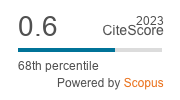Good or Bad Old Times?
Socialist Society and Everyday Life in Ljubljana and its Surroundings in Oral Sources
DOI:
https://doi.org/10.22586/csp.v51i2.8548Keywords:
socialism; Slovenia; Ljubljana; rural hinterland; oral sources; everyday lifeAbstract
This paper examines the memories of socialism and the model of constructing the socialist past in oral sources. Seeking answers regarding the organisation of everyday life, the focus of study was on Ljubljana and its rural surroundings. Presented here are the approaches to understanding everyday socialist life, the influence of various factors on memories of socialism, and the image of everyday socialist life in oral sources. Different life experiences were important in these recollections, as were other factors: family and its historical experience, political and world views, public discourses, and circumstances and discontent with the economic situation at the moment of recording. The time lapse from the end of socialism has freed the memories from former ideological frames, while the changed circumstances have prompted the creation of new myths. In their recollections, witnesses often compared and sought differences between past and present or stressed a different, i.e. unconventional, view of history.
Socialism gradually introduced modernisation and urbanisation, changes in traditional roles and life, relative equality and social security, but also political and economic limitations. Public perception in the time of socialism was also influenced by the rising living standards. The sixties were a time of great changes in Ljubljana and its rural hinterland. Modernisation and new consumer goods gradually became present in urban and rural households, but there were great differences between them. The seventies brought the highest living standards since World War II and increased the quality of life of the entire population, while the gap between the urban and rural living standards and lifestyles became smaller.
Based on oral sources, we can see that people were not greatly interested in politics, being more devoted to private life. The greatest part of their memories was devoted to improving living standards, their work, and resolving their housing problems. In doing so, most people tried to balance their political and economic conditions with their consumer desires and desires for a better life. Although they recognised anomalies in the distribution of material resources and were critical towards this, it is interesting that they reacted to these anomalies by using social capital and informal economies. Despite everything, witnesses saw an improvement in their lives and circumstances during the socialist period until the worst economic crisis in the eighties.
Downloads
Published
How to Cite
Issue
Section
License
Copyright (c) 2019 authors and journal

This work is licensed under a Creative Commons Attribution-NonCommercial 4.0 International License.
Copyright holders are the publisher Croatian Institute of History and the authors. Journal of Contemporary History is an Open Access journal. Users are allowed to read, download, copy, redistribute, print, search and link to material, and alter, transform, or build upon the material, or use them for any other lawful purpose as long as they attribute the source in an appropriate manner according to the Creative Commons licence CC BY-NC. The papers published in Journal of Contemporary History can be deposited and self-archived in the institutional and thematic repositories providing the link to the journal's web pages and HRČAK. Journal does not charge article processing charges (APC). The editors assume no responsibility for statements of fact or opinion made by contributors.




